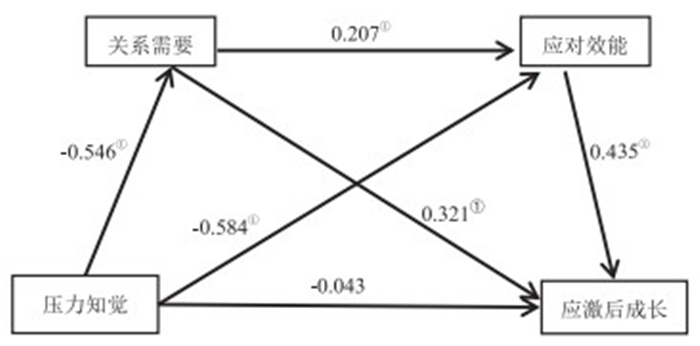Relationship between perceived stress and post-traumatic growth of training recruits among armed police: a chain mediating model
-
+ English摘要:目的 探讨新兵压力知觉影响集训应激后成长的作用方式,以更好地管理新兵的心理健康。方法 采用新兵集训应激后成长量表、中文版压力知觉量表、基本心理需要满足-关系需要分量表和应对效能量表,对675名新兵进行测量,采用SPSS 26.0软件进行描述性统计、相关分析和中介效应检验。结果 回收有效问卷623份,有效率为92.3%。新兵的压力知觉量表总均分为(34.31 ± 8.47)分,关系需要量表总均分为(45.90 ± 7.93)分,应对效能量表总均分为(57.37 ± 7.32)分,应激后成长量表总均分为(81.70 ± 20.56)分。关系需要和应对效能在压力知觉对应激后成长的影响中起部分中介作用,中介作用通过3条路径(P < 0.05)产生效应:(1)由压力知觉、关系需要、应激后成长产生的路径1(效应值为-0.175,占总效应比例为33.59%);(2)由压力知觉、应对效能、应激后成长产生的路径2(效应值为- 0.254,占总效应比例为48.75%);(3)由压力知觉、关系需要、应对效能、应激后成长产生的路径3(效应值为- 0.049,占总效应比例为9.41%)。结论 新兵压力知觉、关系需要、应对效能三者与集训应激后成长关系密切,关系需要和应对效能在新兵压力知觉和集训应激后成长中起到链式中介效应。应关注新兵的情绪状态,营造温暖和谐团队氛围,满足新兵的归属感,增强其行动的自信心和应对效能感,以促进新兵心理成长。
-
尘肺病是以肺组织弥漫性纤维化为主的潜在致死性疾病,是目前我国最常见、最严重的一类职业病,具有不可逆进行性发展的特性。肺部感染是尘肺病最常见的并发症。长期反复全身滥用抗生素和激素,致复杂多菌群感染,微生物产生耐药性,造成临床治疗困难。布地奈德是一种具有高效局部抗炎作用的吸入糖皮质激素,可抑制支气管收缩物质的合成和释放而减轻平滑肌的收缩反应,且毒副作用低。我们选取2015—2016年间住院的尘肺病合并肺部细菌感染病人60例,分别予以常规治疗和加用布地奈德雾化吸入治疗,发现观察组患者的治疗效果优于对照组。现将试验观察的临床数据及护理体会报告如下。
1. 对象与方法
1.1 对象
选取我院(青岛市中心医院)自2015年1月至2016年1月期间收治的尘肺病合并细菌感染病人60例作为研究对象,并将其随机分为对照组(n = 30)和观察组(n = 30),本组60例患者经临床诊断均符合《尘肺病诊断标准》(GBZ 70-2009)[1]及合并细菌感染(新近出现的咳嗽、咳痰或原有呼吸道症状加重,胸部X线显示片状、斑片状浸润性阴影或间质性改变,伴或不伴胸腔积液)的临床诊断标准[2],所有患者或家属均签署知情同意书。
1.2 方法
1.2.1 治疗方法
对照组患者采用常规治疗,选用常规药物如:抗炎、解痉平喘(不加用其他激素类用药)、化痰止咳、吸氧、指导病人进行呼吸功能锻炼和戒烟等[3]。观察组患者除常规治疗外,加用布地奈德雾化吸入治疗,用法用量为:布地奈德的常规用量为2 mg,每日用药2次,持续用药10 d为一疗程。在此期间,对治疗期间发生的不良反应进行观察,第3天、第7天及第10天分别对两组尘肺病患者治疗后的疗效进行比较,一旦有异常情况出现,及时停止用药,并对症处理。
1.2.2 临床护理方法
针对尘肺病患者病情反复不能治愈的特点,我们从心理护理和预防院内感染等方面进行护理。
1)心理护理。因患者大多年龄较大,文化程度又较低,长期疾病反复,不仅使他们的躯体健康下降,心理健康也随之下降,引起抑郁和焦虑情绪[4]。我们针对所有患者制定个性化护理。疾病早期,以热情关怀的态度耐心讲解心理健康的重要性,以缓解患者焦虑紧张情绪,增加患者抵抗力;中期,消除思想顾虑,安定病人情绪,以延缓疾病进展;晚期,给予病人心理安慰,给病人以尊重,让病人体会到生命的尊严。
2)雾化吸入护理。从口腔吸入肺部后,残留在口腔的药物大部分积聚在咽喉部,仅有少部分被咽下,可引起口咽部念珠菌的感染,因此病人每次雾化吸入后,嘱其用干净的清水漱口并洗脸,以减少在口腔及颜面部的残留。在治疗过程中,加强对雾化器的清洁和消毒,以免二次感染发生,导致院内感染发生率增加[5]。
1.2.3 疗效判定标准
在两组基础FEV1值相匹配的情况下,临床治疗效果的标准[6]如下:
显效:患者经治疗后,FEV1 > 80%预计值,各种临床症状如气喘、胸闷、咳嗽以及呼吸困难等症状完全消失;有效:患者经治疗后,70%预计值< FEV1 < 80%预计值,临床症状如气喘、胸闷、咳嗽以及呼吸困难等症状有明显的改善和控制;无效:FEV1 < 70%预计值,患者经治疗后,临床症状如气喘、胸闷、咳嗽以及呼吸困难等症状没有改善和变化,甚至病情加重。
1.2.4 统计学分析
采用SPSS18.0统计学软件对数据进行处理,计量资料以均数±标准差(x ± s)表示,两样本均数比较采用t检验,计数资料以率表示,其比较采用χ2检验,两组等级资料的比较采用有序分类变量的秩和检验。p < 0.05为差异具有统计学意义。
2. 结果
2.1 两组患者基础资料
两组患者中,男性38例,女性22例,年龄为50 ~ 85岁,平均年龄(68.2 ± 1.8)岁,尘肺病程为10 ~ 30年,平均病程(13.3 ± 0.2)年。壹期尘肺25例,贰期18例,叁期17例。两组患者年龄、性别构成及尘肺病程和期别比较,差异均无统计学意义(P > 0.05)。见表 1。
表 1 两组尘肺病患者基础资料比较组别 年龄 病程 性别 尘肺期别 男 女 壹期 贰期 叁期 对照组 68.9 ± 2.4 13.1 ±0.3 18 12 12 8 10 观察组 67.5 ± 1.9 13.5 ±0.2 20 10 13 10 7 t值或X2值 1.644 1.214 0.287 0.792 P值 > 0.05 > 0.05 > 0.05 > 0.05 2.2 两组患者疗效比较
分别在第3天、第7天、第10天比较两组患者的疗效。经秩和检验后可知,治疗后的第3天、第7天,两组患者疗效差异无统计学意义(P > 0.05);第10天,两组患者疗效差异有统计学意义(p < 0.05),其中观察组显效患者15例(占50%),有效患者14例(占46.7%),无效患者1例(占3.3%),总有效率为96.7%;对照组显效患者9例(占30%),有效患者13例(占43.3%),无效患者8例(占26.6%),总有效率为73.3%。见表 2。
表 2 两组尘肺病患者治疗后疗效比较例(占比/%)时间 观察组(n = 30) 对照组(n = 30) Z值 P值 无效 显效 有效 无效 显效 有效 第3天 7(23.3) 10(33.3) 13(43.3) 5(16.7) 9(30.0) 16(53.3) 0.827 0.408 第7天 12(40.0) 12(40.0) 6(20.0) 7(23.3) 10(33.3) 13(43.3) 1.930 0.054 第10天 15(50.0) 14(46.7) 1(3.3) 9(30.0) 13(43.3) 8(26.6) 2.248 0.025 2.3 两组患者肺功能改善情况
治疗前,两组患者FEV1和FEV1/FVC差异均无统计学意义(P > 0.05);治疗后第10天,观察组患者FEV1和FEV1/FVC均值高于对照组,差异均有统计学意义(p < 0.01)。且在治疗后,对照组FEV1和FEV1/FVC均高于治疗前,经配对t检验分析,差异有统计学意义(t = 2.058、2.061,P < 0.05);治疗后,观察组FEV1和FEV1/FVC均高于治疗前,经配对t检验分析,差异有统计学意义(t = 2.261、2.255,P < 0.05)。说明布地奈德的使用能够改善尘肺病患者的肺功能。见表 3。
表 3 两组患者肺功能改善情况比较 (x±s)组别 FEV1治疗前 FEV1/FVC(治疗前) FEV1(治疗后第10天) FEV1/FVC(治疗后第10天) 对照组(n = 30) 70.79 ±3.06 72.75 ± 2.09 72.89 ±3.15 75.53 ± 1.29 观察组(n= 30) 71.75 ±2.01 71.43 ± 1.78 81.12±3.15 81.09 ±2.13 t值 1.873 1.782 12.721 9.154 P值 0.323 0.245 0.000 0.015 [注]FEV1以实测值占预计值的百分数计; FEV1/FVC以百分数计 3. 讨论
尘肺病主要临床表现为咳嗽、咳痰和呼吸困难等症状。由于长期反复感染,久治不愈,导致患者身体抵抗力下降,从而引发各种并发症;发展到晚期,病人气短、咳嗽等症状明显,甚至不能平卧,造成极大痛苦。肺部反复感染是尘肺病患者最常见的并发症,就目前治疗方式来说,药物治疗仍然是治疗尘肺病合并感染的有效常用手段。
布地奈德是20世纪90年代由英国阿斯利康制药公司开发的一种肾上腺糖皮质激素类药物,用于非糖皮质激素依赖性或糖皮质激素依赖性的支气管哮喘、哮喘性慢性支气管炎、慢性阻塞性肺部疾病的治疗[7]。布地奈德具有较高的糖皮质激素受体结合率,作用强、起效快,它能增强内皮细胞、平滑肌细胞和溶酶体膜的稳定性,抑制免疫反应和降低抗体合成,从而使组胺等过敏活性介质的释放减少、活性降低,并能减轻抗原抗体结合时激发的酶促过程,抑制支气管收缩物质的合成和释放而减轻平滑肌的收缩反应,降低炎症反应[8]。布地奈德雾化吸入为局部性用药,具有气道局部抗炎作用强、全身副作用小的特点[9]。利用喷雾吸入式的方式进行治疗,能使药物直接作用于支气管上皮细胞,提高疗效,迅速促进呼吸道平滑肌松弛,还能降低气道压力,增加肺活量。
本次治疗过程中,在给予患者药物治疗的同时,通过优质到位的心理护理,使患者不仅能够了解疾病的相关知识,还能提高其防病治病的意识和生活质量,改善患者心理健康,使其配合治疗,增强战胜疾病的信心。
本次研究发现,两组患者治疗后的肺功能较治疗前均有所改善,且采用布地奈德雾化吸入的观察组FEV1、FEV1/FVC均明显高于采用常规治疗的对照组,差异有统计学意义(p < 0.05);在治疗的第10天,观察组疗效优于对照组,差异亦有统计学意义(p < 0.05);且观察组的总有效96.7%高于对照组的73.3%。因此,笔者认为,布地奈德雾化吸入治疗尘肺病并发肺部感染的临床效果显著,且用药安全性相对较高,能提高患者的生活质量,缩短了治疗周期,值得临床上推广应用。
作者声明 本文无实际或潜在的利益冲突 -
图 1 压力知觉、关系需要、应对效能与应激后成长的相互作用路径
注:图 1 中的值为偏回归系数;① P < 0.01。
表 1 623名新兵压力知觉、关系需要、应对效能与应激后成长的相关分析
(x ± s,分) 变量 总分 均分 r值 压力知觉 关系需要 应对效能 压力知觉 34.31 ± 8.47 2.45 ±0.61 关系需要 45.90 ±7.93 5.74 ± 0.99 -0.55① 应对效能 57.37 ± 7.32 3.37 ± 0.43 -0.70① 0.53① 应激后成长 81.70 ±20.56 3.71 ±0.93 -0.52① 0.57① 0.63① 注:① P < 0.01。 表 2 关系需要和应对效能链式中介模型中变量关系的回归分析(n = 623)
结果变量 预测变量 r值 r2值 偏回归系数 标准误 t值 P值 关系需要 压力知觉 0.546 0.298 -0.546 0.032 -16.246 < 0.001 应对效能 压力知觉 0.718 0.516 -0.584 0.029 -17.490 < 0.001 关系需要 0.207 0.031 6.210 < 0.001 应激后成长 压力知觉 0.695 0.483 -0.043 0.102 -1.018 0.309 关系需要 0.321 0.092 9.027 < 0.001 应对效能 0.435 0.117 10.476 < 0.001 表 3 不同路径之中介效应值
路径 间接效应值 Boot标准误 Boot 95%CI值 相对中介效应/% 总间接效应 - 0.175 - 0.254 - 0.049 = - 0.478 0.038 - 0.553 ~ - 0.405 91.75 PS-RN-PTG - 0.546 × 0.321 = - 0.175 0.025 - 0.227 ~ - 0.130 33.59 PS-CE-PTG - 0.584 × 0.435 = - 0.254 0.031 - 0.316 ~ - 0.194 48.75 PS-RN-CE-PTG - 0.546 × 0.207 × 0.435 = - 0.049 0.011 - 0.072 ~ - 0.030 9.41 注:PS为压力知觉,RN为关系需要,CE为应对效能,PTG为应激后成长。 -
[1] 马连新. 新兵集训过程中心理问题的研究[D]. 长春: 东北师范大学, 2013. [2] 田益沁, 左昕, 彭李, 等. 集训期新兵心理应激水平及特点[J]. 中华行为医学与脑科学杂志, 2016, 25(9): 830-832. [3] 张月娟, 戴卫民, 周喻, 等. 武警新兵精神障碍筛检结果分析[J]. 武警医学, 2013, 24(7): 561-563. doi: 10.3969/j.issn.1004-3594.2013.07.003 [4] 张猜, 张月娟, 朱志坚, 等. 新入伍军人集训应激后成长的调查研究[J]. 中华灾害救援医学, 2018, 6(6): 306-309. https://www.cnki.com.cn/Article/CJFDTOTAL-JYZH201806004.htm [5] 缪毅, 彭李, 李敏, 等. 军医大学新生集训应激后成长及影响因素分析[J]. 第三军医大学学报, 2012, 34(17): 1793-1796. https://www.cnki.com.cn/Article/CJFDTOTAL-DSDX201217026.htm [6] 胡琴. 新兵集训创伤后成长状况及影响因素研究[D]. 天津: 天津大学, 2016. [7] JOSEPH S, MURPHYD, REGELS. An affective-cognitive processing model of post-traumatic growth[J]. Clin Psychol Psychother, 2012, 19(4): 316-325. doi: 10.1002/cpp.1798
[8] 李杨, 刘春娥. 癌症病人压力知觉的研究进展[J]. 护理研究, 2018, 32(9): 1345-1348. https://www.cnki.com.cn/Article/CJFDTOTAL-SXHZ201809006.htm [9] 曹振宇, 刘莉, 王卫国, 等. 述情障碍, 社会支持与新兵适应不良的相关性分析[J]. 武警后勤学院学报(医学版), 2019, 28(3): 48-53. https://www.cnki.com.cn/Article/CJFDTOTAL-WUXB201903011.htm [10] 朱志坚, 张月娟, 王乾宇, 等. 新兵集体效能感与集训应激后成长的关系: 积极情绪和应对方式的中介作用[J]. 中国临床心理学杂志, 2020, 28(3): 566-570. https://www.cnki.com.cn/Article/CJFDTOTAL-ZLCY202003028.htm [11] RYAN R M, DECI E L. Self-determination theory: basic psychological needs in motivation, development, andwellness[M]. New York: Guilford Press, 2017.
[12] 吴才智, 荣硕, 朱芳婷, 等. 基本心理需要及其满足[J]. 心理科学进展, 2018, 26(6): 1063-1073. https://www.cnki.com.cn/Article/CJFDTOTAL-XLXD201806012.htm [13] 陈晨, 刘玉新, 赵晨. 独立, 协同和平衡视角下的单维式基本心理需要满足[J]. 心理科学进展, 2020, 244(12): 102-116. https://www.cnki.com.cn/Article/CJFDTOTAL-XLXD202012010.htm [14] 胡夏娟. 大学生压力知觉、复原力和心理幸福感的关系研究[D]. 石家庄: 河北师范大学, 2009. [15] LAZARUS R S, FOLKMAN S. Transactional theory and research on emotions and coping[J]. Eur J Personality, 1987, 1(3): 141-169. doi: 10.1002/per.2410010304
[16] SANDLER I N, TEIN J Y, MEHTA P, et al. Coping efficacy and psychological problems of children of divorce[J]. Child Dev, 2000, 71(4): 1099-1118. doi: 10.1111/1467-8624.00212
[17] BENIGHT C C, SHOJI K, JAMES L E, et al. Trauma coping self-efficacy: a context-specific self-efficacy measure for traumatic stress[J]. Psychol Trauma, 2015, 7(6): 591-599. doi: 10.1037/tra0000045
[18] 李傲. 结构式团体沙盘对大学生压力应对效能的干预研究[D]. 成都: 电子科技大学, 2020. [19] 张琳若. 高中生应对效能与心理健康的关系及干预研究[D]. 武汉: 华中师范大学, 2018. [20] 张月娟, 高飞, 朱志坚, 等. 新兵集训应激后成长量表的初步编制[J]. 武警后勤学院学报(医学版), 2019, 28(4): 21-25. https://www.cnki.com.cn/Article/CJFDTOTAL-WUXB201904007.htm [21] 杨廷忠, 黄汉腾. 社会转型中城市居民心理压力的流行病学研究[J]. 中华流行病学杂志, 2003, 24(9): 760-764. doi: 10.3760/j.issn:0254-6450.2003.09.004 [22] 喻承甫, 张卫, 曾毅茵, 等. 青少年感恩、基本心理需要与病理性网络使用的关系[J]. 心理发展与教育, 2002, 28(1): 83-90. https://www.cnki.com.cn/Article/CJFDTOTAL-XLFZ201201012.htm [23] 童辉杰. 应对效能: 问卷的编制及理论模型的建构[J]. 心理学报, 2005, 37(3): 413-419. https://www.cnki.com.cn/Article/CJFDTOTAL-XLXB20050300I.htm [24] 张月娟, 胡琴, 高飞, 等. 新兵集训反刍性沉思, 社会支持与创伤后成长的关系[J]. 中国临床心理学杂志, 2017, 25(6): 114-118. https://www.cnki.com.cn/Article/CJFDTOTAL-ZLCY201706024.htm [25] 周少林. 武警官兵人格特征与应对方式研究: 压力知觉的中介效应[D]. 长沙: 湖南师范大学, 2014. [26] 尹丽慧. 入伍新兵基本心理需要满足与心理幸福感的关系研究[D]. 昆明: 云南师范大学, 2015. [27] 陈本月. 大学生压力知觉、希望和压力后成长关系研究[D]. 桂林: 广西师范大学, 2016. [28] 窦欣宇, 朱守林, 周晓敏. 心理复原力及反刍性沉思在胃癌患者术后压力知觉与创伤后成长间的链式中介效应[J]. 中国实用护理杂志, 2020, 36(6): 424-429. doi: 10.3760/cma.j.issn.1672-7088.2020.06.006 [29] FREDRICKSON B L. The role of positive emotions in positive psychology: the broaden-and-build theory of positive emotions[J]. Am Psychol, 2001, 56(3): 218-226. doi: 10.1037/0003-066X.56.3.218
[30] 王伟. 武警新兵新训前后心理健康状况的对比研究[J]. 中国健康心理学杂志, 2007, 15(7): 648-650. doi: 10.3969/j.issn.1005-1252.2007.07.040 [31] 李传玲. 贫困大学生应对效能、应对方式和心理健康的关系研究[D]. 武汉: 华中科技大学, 2007. [32] SKOK A, HARVEY D, REDDIHOUGH D. Perceived stress, perceived social support, and wellbeing among mothers of school-aged children with cerebral palsy[J]. J IntellDisabil Res, 2006, 31(1): 53-57.
[33] 周慧. 大学生应对效能相关因素研究及训练实验[D]. 苏州: 苏州大学, 2006. [34] SARANJAM R, FOROUZANFAR A, SAMAVI A. Predicting coping self-efficacy based on social support, personal growth, and mindfulness in people with cancer[J]. J Res Health, 2019, 9(4): 363-370. doi: 10.29252/jrh.9.4.363
[35] GUO T F, NI Y K, L I Q L, et al. The power of faith: the influence of athletes' coping self-efficacy on the cognitive processing of psychological Stress[J]. Front Psychol, 2019, 10: 1565. doi: 10.3389/fpsyg.2019.01565
-
期刊类型引用(2)
1. 石美华. 急诊护理流程优化对急诊患者抢救效率的影响. 中国医药指南. 2023(01): 22-25 .  百度学术
百度学术
2. 杨凤巧,李小勤,吴茵. 急救创伤专科护士核心能力评价指标体系的构建. 中华现代护理杂志. 2023(31): 4303-4309 .  百度学术
百度学术
其他类型引用(5)





 下载:
下载:

